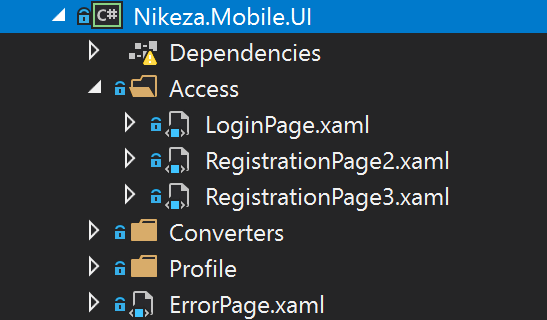Intro
In the last blog post, I discussed domain event handlers whose sole purpose is to execute side effects for application usefulness. In this blog post, I’ll be discussing file structure and how it relates to specification.
File Structure
An application can be organized into the following file folders:
- Domains
- Integration
- Specifications
- Tests
Here’s an example:

Domain Libraries
The domain folder harbors domain responsibilities for the application. These responsibilities include workflows, attempts, and queries.

A domain library is an interpreter. As a result, each domain library maintains a reference to its specification library’s data types and function types for implementing workflows, attempts, queries, and external dependencies.

Specification Library
As stated earlier, a domain relies on a specification. Thus, a specification library supplies a domain library with the data types required for workflows, attempts, queries, and external dependencies.

Code is shown for each of the files below.
Language.fs
The Language file supplies the domain specific types that the Access domain requires for its operations.
namespace Nikeza.Access.Specification
type Email = Email of string
type Password = Password of string
type EntityName = EntityName of string
type FirstName = FirstName of string
type LastName = LastName of string
type Form = {
Email: Email
Password: Password
Confirm: Password
}
type UnvalidatedForm = Unvalidated of Form
type ValidatedForm = Validated of Form
Commands.fs
The Commands file supplies commands that the Access domain requires for its operations.
namespace Nikeza.Access.Specification.Commands
open Nikeza
open DataTransfer
open Nikeza.Access.Specification
type LoginCommand = Login of Credentials
type LogoutCommand = Logout of Provider
module Registration =
type ValidateCommand = Validate of UnvalidatedForm
type AttachCommand = Attach of ValidatedForm
module Validate =
module ResultOf = type Validate = Executed of Result
module Submit =
module ResultOf = type Submit = Executed of Result
module Session =
module ResultOf =
type Login = Login of Result
type Logout = Logout of Result
Events.fs
The Events file supplies the domain specific events that the Access domain requires for its operations.
namespace Nikeza.Access.Specification
open Nikeza
open DataTransfer
module Events =
type RegistrationValidationEvent =
| FormValidated of ValidatedForm
| FormNotValidated of UnvalidatedForm
type RegistrationSubmissionEvent =
| RegistrationSucceeded of DataTransfer.Profile
| RegistrationFailed of ValidatedForm
type LoginEvent =
| LoggedIn of Provider
| FailedToConnect of Credentials
| FailedToAuthenticate of Credentials
type LogoutEvent =
| LoggedOut of Provider
| LogoutFailed of Provider
Functions.fs
The Functions file supplies domain specific functions for the Access domain.
namespace Nikeza.Access.Specification
open Nikeza
open Common
open Events
module Workflows =
open Nikeza.Access.Specification.Commands
type ValidateWorkflow = Registration.ValidateCommand -> RegistrationValidationEvent nonempty
module Session =
open Nikeza.Access.Specification.Commands.Session
type HandleLogin = ResultOf.Login -> LoginEvent nonempty
type HandleLogout = ResultOf.Logout -> LogoutEvent nonempty
module Submission =
open Commands.Registration.Submit
type RegistrationSubmission = ResultOf.Submit -> RegistrationSubmissionEvent nonempty
module Validation =
open Commands.Registration.Validate
type ValidateForm = UnvalidatedForm -> Result
type RegistrationValidation = ResultOf.Validate -> RegistrationValidationEvent nonempty
Attempts.fs
The Attempts file supplies domain specific interfaces that the Access domain requires for exception prone operations.
namespace Nikeza.Access.Specification
open Nikeza
open DataTransfer
module Attempt =
type Submit = ValidatedForm -> Result
type Login = Credentials -> Result
type Logout = Provider -> Result
module Attempts =
open Nikeza.Access.Specification.Commands
type SubmitAttempt = Attempt.Submit -> Registration.AttachCommand -> Result
type LoginAttempt = Attempt.Login -> LoginCommand -> Result
type LogoutAttempt = Attempt.Logout -> LogoutCommand -> Result
Dependencies.Login.fs
The Login Dependencies file supplies the types that are used for injecting the dependencies required for the Login operation.
namespace Nikeza.Access.Specification
open Events
open Nikeza.Common
module Login =
open Attempt
type Attempt = {
Login : Login
}
type SideEffects = {
ForLoginAttempt : (LoginEvent -> unit) nonempty
}
type Dependencies = {
Attempt : Attempt
SideEffects : SideEffects
}
Dependencies.registration.fs
The Registration Dependencies file supplies the types that are used for injecting the dependencies required for the Registration operation.
namespace Nikeza.Access.Specification
open Events
module Registration =
open Nikeza.Access.Specification.Attempt
type Attempt = {
Submit : Submit
}
type SideEffects = {
ForRegistrationSubmission : (RegistrationSubmissionEvent -> unit) list
}
type Dependencies = {
Attempt : Attempt
SideEffects : SideEffects
}
Access Library
The Access library is a domain library that harbors interpreters for the attempt and workflow specifications. In addition to the interpreters, the library also has modules that are responsible for converting the status result of registration and session operations into domain events.
Here are the files for the Access domain:
Interpret.attempts.fs
The Interpret Attempts file harbors the implementation details for attempt operations. These operations usually rely on IO (i.e. web requests). In this implementation, we just return a status result of Error for now.
module Nikeza.Mobile.Access.Attempt
open Nikeza.Access.Specification
let submit : Attempt.Submit =
fun validatedForm -> Error validatedForm
let logout : Attempt.Logout =
fun provider -> Error provider
let login : Attempt.Login =
fun credentials -> Error credentials
Interpret.workflow.fs
The Interpret Workflow file harbors the implementation details for workflow operations.
module internal Logic.Registration
open System
open Nikeza.Common
open Nikeza.Access.Specification
open Nikeza.Access.Specification.Validation
type ValidatedForm = Nikeza.Access.Specification.ValidatedForm
type UnvalidatedForm = Nikeza.Access.Specification.UnvalidatedForm
let validate : ValidateForm =
fun (Unvalidated form) ->
let isValidEmail (Email email) = email |> String.length > 3
let (password,confirm) =
(form.Password |> function Password p -> p, form.Confirm |> function Password p -> p)
if not (form.Email |> isValidEmail) then
Unvalidated form |> Error
elif String.length password < 3 then
Error <| Unvalidated form
elif not (password = confirm) then
Error <| Unvalidated form
else Ok <| Validated form
let isValid (credentials:LogInRequest) =
let validEmail = not <| String.IsNullOrEmpty(credentials.Email)
let validPassword = not <| String.IsNullOrEmpty(credentials.Password)
validEmail && validPassword
ResultOf.session.fs
The ResultOf Session file converts a status result to a list of domain events.
namespace Are
open Nikeza.Access.Specification.Commands.Session
open Nikeza.Access.Specification.Events
open Nikeza.Access.Specification.Session
open Nikeza.Common
open Nikeza.DataTransfer
module Login =
let events : HandleLogin = function
ResultOf.Login result ->
result |> function
| Ok info ->
info |> function
| Some p -> { Head= LoggedIn p; Tail=[] }
| None -> let credentials = { Credentials.Email=""; Credentials.Password="" }
{ Head= FailedToAuthenticate credentials; Tail=[] }
| Error info -> { Head= FailedToConnect info; Tail=[] }
module Logout =
let events : HandleLogout = function
ResultOf.Logout result ->
result |> function
| Ok p -> { Head= LoggedOut p; Tail= [] }
| Error p -> { Head= LogoutFailed p; Tail= [] }
ResultOf.registration.fs
The ResultOf Registration file converts a status result to a list of domain events.
namespace Are
open Nikeza.Common
open Nikeza.Access.Specification.Events
module Submission =
open Nikeza.Access.Specification.Commands.Registration.Submit
open Nikeza.Access.Specification.Submission
let events : RegistrationSubmission = function
ResultOf.Submit
.Executed result ->
result |> function
| Ok profile -> { Head= RegistrationSucceeded profile; Tail=[] }
| Error form -> { Head= RegistrationFailed form; Tail=[] }
module internal Validation =
open Nikeza.Access.Specification.Commands.Registration.Validate
open Nikeza.Access.Specification.Validation
let events : RegistrationValidation = function
ResultOf.Validate
.Executed result ->
result |> function
| Error form -> { Head= FormNotValidated form; Tail=[] }
| Ok form -> { Head= FormValidated form; Tail=[] }
Workflows.fs
The Workflows file harbors the high-level implementation details for workflow operations.
module Nikeza.Mobile.Access.In
open Nikeza.Access.Specification.Commands.Session
open Nikeza.Access.Specification.Workflows
open Nikeza.Access.Specification.Commands
open Logic
module ValidateRegistration =
open Registration.Validate
open Nikeza.Access.Specification.Commands.Registration
let workflow : ValidateWorkflow = function
Validate form ->
form |> Registration.validate
|> ResultOf.Validate.Executed
|> Are.Validation.events
Attempt.fs
The Attempts file harbors the high-level implementation details for attempt operations.
module Nikeza.Mobile.Access.Using
open Nikeza.Access.Specification.Attempts
open Nikeza.Access.Specification.Commands
open Logic
module ValidatedForm =
let attempt : SubmitAttempt =
fun submit -> function
Registration.Attach form ->
form |> submit
module Login =
let attempt : LoginAttempt =
fun login -> function
Login credentials ->
credentials |> login
module Logout =
let attempt : LogoutAttempt =
fun logout -> function
Logout provider ->
provider |> logout
Integration Libraries
The Integration folder harbors libraries that are focused on side effects. This includes libraries that would focus on user interfaces, web requests, and data persistence.
The integration folder could look like the following:

AppLogic Library
The AppLogic library houses domain event handlers. In other words, this library handles the side effects for the application. Such side effects are page navigation, logging, and data persistence.
The following files deal with side effects:

UILogic Library
The UILogic library houses the view-model factory, view-models, page types, and an MVVM Command implementation.
The following files deal with UILogic:

UI
The UI library contains the actual page implementations for the application to render:

Conclusion
In conclusion, I discussed the file structure that supports Specification as a Library. Specifically, I showed the Domains, Integration, and Specifications folders. I then showed the file contents for the Access Specification library.
